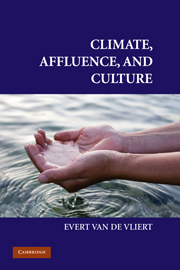6 - Cooperation
from PART THREE - SURVIVAL, COOPERATION, AND ORGANIZATION
Published online by Cambridge University Press: 21 August 2009
Summary
Cooperation is the master key to genetic survival, and climatic survival is the master key to cooperation.
Cultures the world over are both constant and in continuous transition. A major reason for the constancy of cultures may well be that they thrive in stable climato-economic niches that do not yo-yo like the daily weather and the amount of money in our pockets. And a major reason for the never-ceasing transition of cultures may be that we, the carriers of cultures, are born and die. Birth and death have the inevitable consequence that some values and practices are not picked up by children from adults, or transmitted by adults to children, whereas newly developed values and practices are successfully passed on to following generations.
The parent-child relation is the crucial core of the dynamic stability of culture. One of the most rudimentary things parents have to teach their children, by setting good examples and giving instructions and feedback, is cooperativeness. Babies are selfish, and toddlers must learn to have less than maximal concern for their own goals (unselfishness) and more than minimal tolerance and respect for other people's goals (prosociality). This is a difficult process with increasingly more trials and, at best, increasingly fewer errors.
Considerable differences exist around the globe in the degrees to which unselfishness and prosociality play a part in daily life (Bierhoff, 2002; Kabasakal & Bodur, 2004; Schroeder et al., 1995).
- Type
- Chapter
- Information
- Climate, Affluence, and Culture , pp. 137 - 164Publisher: Cambridge University PressPrint publication year: 2008

